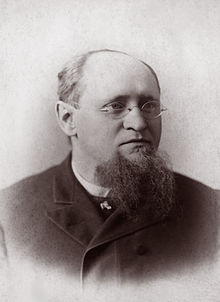Rudolf Arndt

Rudolf Gottfried Arndt (31 March 1835 – 29 January 1900) was a German psychiatrist from Bialken, district of Marienwerder.
Biography
Arndt studied in Greifswald and Halle. As a student, his instructors included Felix von Niemeyer (1820–1871), Heinrich Adolf von Bardeleben (1819–1895), and Heinrich Philipp August Damerow (1798–1866).[1] He was conferred doctor of medicine on 20 February 1860. From 1861 he maintained a private practice, and also participated in the Second Schleswig War (1864), Austro-Prussian War (1866) and Franco-Prussian War (1870–71).
In 1867 he obtained his habilitation, subsequently serving as director of the Irren-Heil- und Pflege-Anstalt in Greifswald. In 1873 he became an associate professor of psychiatry at Greifswald.[2] He died of angina pectoris.[3]
He is known today for the "Arndt-Schulz rule", a pharmacologic principle of homeopathy that is named in conjunction with German chemist Hugo Schulz (1853-1932).[4] He is also remembered for his investigations of neurasthenia.[5][6]
Awards and decorations
- Order of the Crown, 4th class with Swords (Prussia, 1866)
- Iron Cross of 1870, 2nd class on white-black band (Prussia, 1871)
- Knight's Cross, First Class of the Order of the Zähringer Lion (Baden)
Selected writings
- Aus einem apoplectischen Gehirn, 1878 - On the apoplectic brain.
- Die Neurasthenie (Nervenschwäche), ihr Wesen, ihre Bedeutung und Behandlung, 1885 - Neurasthenia (nerve weakness), its nature, its meaning and treatment.
- Der Verlauf der Psychosen, 1887 (with August Dohm) - The course of psychosis.
- Was sind Geisteskrankheiten?, 1897 - What is mental illness? [7]
See also
References
- ^ Pagel: Biographical Dictionary outstanding physicians of the nineteenth century. Berlin, Vienna, 1901, 44-45 Sp. (biography)
- ^ NDB/ADB Deutsche Biographie (biography)
- ^ Rudolf Arndt @ Who Named It
- ^ Medical Dictionary Arndt-Schulz rule
- ^ Google Books Diseases of the Nervous System by Archibald Church
- ^ Man and Woman: Study of Human Secondary Sexual Characters by Havelock Ellis
- ^ IDREF.fr (bibliography)
- 1835 births
- 1900 deaths
- People from Kwidzyn County
- People from the Province of Prussia
- German psychiatrists
- German military doctors
- Prussian people of the Austro-Prussian War
- German military personnel of the Franco-Prussian War
- University of Greifswald alumni
- University of Greifswald faculty
- Martin Luther University of Halle-Wittenberg alumni
- Recipients of the Iron Cross (1870), 2nd class
- Knights First Class of the Order of the Zähringer Lion
